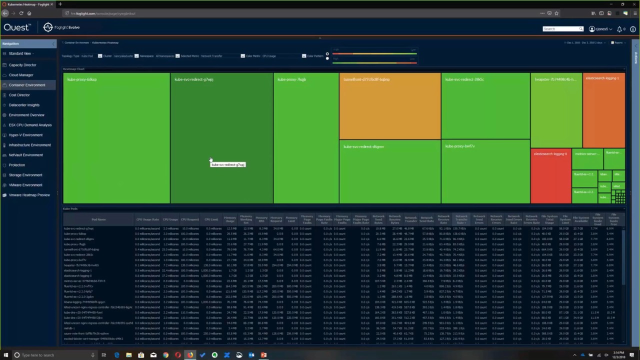Foglight Evolve Container Management
Powerful container management and monitoring across your IT environment. Using containers to modernize application deployment is about to get a whole lot easier with Foglight Evolve. This powerful solution delivers real-time and historical analytics of containers and their hosts, across physical, virtual and cloud environments, giving you the container monitoring metrics needed to make the optimal choices when it comes to container deployment.
 03:03
03:03
Key Benefits
Simplify the use of containers
Ensure optimal container performance
Maintain a common toolset to see containers in context
Container management without the struggle
Many IT organizations aim to modernize and “cloud architect”
application deployment and management through the use of containers. These
standard units of software package up code and all its dependencies so
applications can be quickly deployed, scaled and, if needed, reliably migrated
from on-premises to a public cloud. Foglight Evolve ensures your ability to
onboard, operate and support containerization without the struggle.

Simplify container management
Foglight Evolve makes using containers significantly easier by providing real-time and historical analytics of containers and their hosts, across physical, virtual and cloud environments. This container management tool identifies performance bottlenecks, failed containers and issues within the orchestration layer.

Avoid hours of guesswork
Foglight Evolve keeps container data in-context with the supporting infrastructure. This unique approach helps infrastructure teams assimilate container technology more easily by removing the guesswork and hours of troubleshooting normally associated with contention within a container compute and storage platform.

Ensure a common toolset
The co-operation and data sharing typically required from DevOps is often impacted by using disparate tools. Foglight Evolve provides a common toolset for infrastructure and application IT staff to see containers in-context with the infrastructure that supports them. With Foglight Evolve, you can ensure optimal container performance through real-time and historical metrics on shared commute performance.
Features
Collects inventory, infrastructure, OS, host, cluster, node, pod and orchestration data via a remote APIs. Also collects data from the underlying cloud IaaS or on-premises hypervisors.
Docker swarm monitoring
Gathers data from all Docker components, clusters, hosts and containers, as well as the supporting physical, virtual or cloud infrastructure.
Dependency mapping
Captures accurate performance metrics for both virtual machines and containers when used with Foglight for Virtualization. If the supporting infrastructure is impacting container performance, you can isolate the issue.
Container heat map
Provides a view into real-time and historical usage of resources (containers, clusters and hosts) and makes it simple to eliminate resource hogs.
Container scatterplot
Allows you to pivot Docker hosts, clusters and containers across any collected
metric by three dimensions (i.e. “Find containers with high CPU, high
memory and color code the containers with high egress network traffic."
Specifications
- Windows Server (2003, 2008 R2, 2012, 2012R2, 2016)
- Linux ( Cent OS, RH Ent, Oracle, SUSE, Ubuntu)
- Foglight Management Server
- 4 vCPUs
- 6 GB of memory
- 120 GB of disk storage
- VMware: VirtualCenter (VCMS) 2.5.x, vCenter Server and vSphere up to version 6.x, vCloud 5.5 and View 5.0 and higher, VMware Cloud on AWS
- Microsoft Hyper-V: Windows Server 2008 R2 and higher
- Kubernetes: Version 1.7 to version 1.12
- Docker Swarm: Docker Engine, CE, EE 17.03
- Azure Cloud Instances VM (ARM)
- AWS EC2 Instances
- Cloud Kubernetes Service,including:
- Azure Kubernetes Service (AKS)
- Amazon Elastic Container Service for Kubernetes (EKS)
- Google Kubernetes Engine (GKE)
- IBM Cloud Kubernetes Service
Resources
Tech company expects to save $1.4 million by optimizing VMs
Dell's infrastructure engineering and operations (IEO) team is responsible for managing all of Dell IT's VMs — more than ...
Disaster Recovery’s Just the Beginning
ActualTech explains how deep insight into your IT infrastructure at all layers makes it possible to anticipate problems, so you...
Downtime Costs How Much? Calculating the Business Value of Disaster Recovery
This eBook provides ideas on how to quantify the value of disaster recovery to the business.
9 Steps to Disaster Recovery Planning
In this e-book, we start by highlighting the top business threats, and then offer nine steps you can implement to build a busin...
Financial services company boosts the business value of databases
AmTrust Financial Services monitors and improves database performance by relying on Quest® Foglight® software to deliver action...
